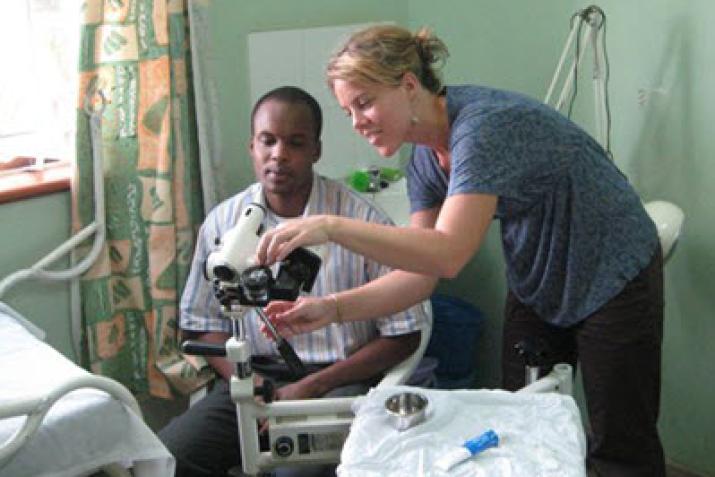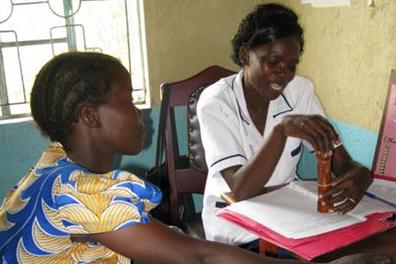
Megan Huchko trains a clinical officer in Kisumu, Kenya, in colposcopy and other low-cost cervical cancer screening strategies.
Published February 27, 2018, last updated on April 21, 2020 under Research News
Today marks the launch of the Center for Global Reproductive Health, led by Megan Huchko, associate professor of obstetrics & gynecology and global health and based at the Duke Global Health Institute (DGHI). The Center will foster expertise on policies, programs and innovations in reproductive health through rigorous research, education and strong relationships with partner countries. One of Huchko’s goals for the Center is to elevate Duke University as a leader in global reproductive health.
Center members aim to cultivate new collaborations; educate the public, researchers and students on domestic and global reproductive health issues; and inspire and build the next generation of global reproductive health leaders at Duke and across the world.
The Center will focus on a range of global reproductive health issues, including safe motherhood, cervical cancer prevention, family planning, preventing and treating sexually transmitted infections and HIV/AIDS prevention.
“We’d like the Center to be a place where people interested in global reproductive health can develop projects and find research partners or mentors,” said Huchko. “We hope to bring together experts from countries in East Africa so we can strengthen our collaborations between the countries and create more opportunities for students and trainees to build expertise in global reproductive health.”

Family planning counseling is provided...
DGHI has a strong track record of research in the area of Maternal, Adolescent and Child Health (MACH). The new Center will focus specifically on the structural factors and social determinants of health that relate to reproductive health across the lifespan. For example, Huchko said, topics such as safe abortion, family planning and cervical cancer tend not to fit squarely under the MACH umbrella. “There’s a lot of value in thinking about reproductive and sexual health separately, because it’s more inclusive of all women—not just mothers—and takes into account more of the societal factors that contribute to a gender disparity in outcomes,” she said.
“Maternal and child health has long been a priority and an area of strength for DGHI, and the Center for Global Reproductive Health will enable us to expand our focus to include these additional factors that are so critical to women’s health both globally and in our local communities,” said DGHI director Chris Plowe. “The Center will spark new innovations, interventions and policies to help alleviate disparities in sexual and reproductive health, initially in East Africa, and ultimately around the world—including here at home.”
The Center builds on groundwork laid by Huchko and several other Duke faculty members and researchers from Kenya, Tanzania and Uganda. Several projects and programs are already underway, including:
- A cluster-randomized trial of high-risk HPV testing offered in community-health campaigns versus government health facilities
- A pilot study of the acceptability and feasibility of HPV testing in HIV-testing campaigns
- A faculty/student research team developing an interactive, web-based platform visualizing contraceptive discontinuation
- Undergraduate, graduate and medical resident research experiences in western Kenya
- An abortion policy mapping project identifying global access to safe abortion care
One of Huchko’s motives for establishing the Center is to “model a system in which we’re working side-by-side with the East Africans as they take the lead on global reproductive health initiatives that are critical to their communities.” She sees her East African counterparts as the next generation of leaders in research, education and program development.
The work of several Center members, she says, embodies this goal. Gynecologic cancer specialist Paula Lee, for example, is collaborating with the University of California at San Francisco, the Uganda Cancer Institute and the Africa Development Bank to create and support the first East-African Gynecologic Oncology fellowship through Makerere University and Mulago National Referral Hospital in Uganda. And John Schmitt, professor of obstetrics & gynecology and global health, serves as a teaching consultant in obstetrics and gynecology at the Kilimanjaro Christian Medical Center in Moshi, Tanzania.
Huchko has also established a field office for the Center in Kisumu, Kenya. At this growing reproductive health research hub, researchers will collaborate on joint research studies, share knowledge and disseminate new information in the field of reproductive health. This site will also serve as a research base for students and trainees from Duke and East African universities. Currently the Center is focusing on East Africa, but Huchko hopes to expand its work to other regions in the future.
Don’t Miss These Upcoming Center Events!
Center-sponsored events provide a way to learn more about global reproductive health and connect with other researchers, trainees and students with similar interests.
February 28 – How Gender, Race, and Ethnicity Can Impact Leadership Opportunities
The Center is currently hosting a three-day intensive Global Reproductive Health Leadership Symposium at Duke, where Duke scholars and students and invited guests from Duke, Kenya, Tanzania and Uganda are sharing their research, attending skill building sessions and networking. The symposium includes a public event on Feb. 28—a lunchtime panel discussion on gender, race, ethnicity and leadership—facilitated by Kathleen Sikkema, the Gosnell Family Professor of Global Health and the director of DGHI’s Global Mental Health Initiative. Panelists include:
- Lola Fayanju, surgical oncologist, Duke Cancer Center
- Nimmi Ramanujam, Robert W. Carr, Jr., Professor of Biomedical Engineering and professor of global health
- Sally Kornbluth, Provost
Learn more about this event.
March 8 – International Women’s Day Celebration
Join members of the Center for Global Reproductive Health at Duke on March 8 to celebrate International Women’s Day and the opening of the Center. The afternoon event will include remarks by Huchko and Plowe, as well as a few speakers sharing stories of their work to improve the lives of women and girls around the world, followed by a celebratory reception.
Learn more about this event.
Learn more about the Center for Global Reproductive Health and follow the Center on Twitter at @RHatDGHI!


